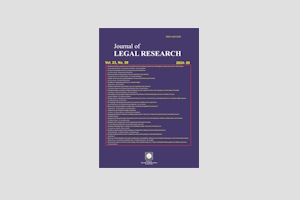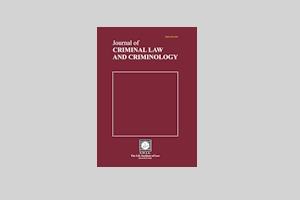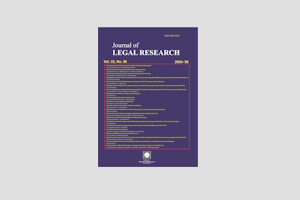Journal of
LEGAL RESEARCH
Number 26
Vol. XIII ● No. 2
Autumn2014 – Winter 2015
Managing Editor: Vahid Eshtiagh
Editor-in-Chief: Seyyed Ghasem Zamani
CONTENTS
Articles
Using of Human Shield as a War Crime
Homayoon Habibi – Saleheh Ramezani
An analysis on interpretation of guardian council about Experimental Laws in three bills of “organization and procedure of Court of Administrative Justice”, “customs affairs” and “commercial”
Vahid Agah
Possibility or impossibility of rehabilitation of legal entities and its condition in trade law act of 1311 looking to trade reform bill
Mehdi Sokhanvar – Seyed Ali Hoseyni
Monopoly in the light of Regulations and it’s Enforcement in Iran Laws
Heidar Piri – Mehdi Montazer – Azam Momeni Shio Yari
Succession of States in respect of State property and Debts
Alireza Bagheri Abyaneh
International Law and Human Security at the Third Millennium
Armin Talaat
The Role of Time Element In the interpretation of the International treaty
Mozhgan Raminnia
Status of Corporate Governance in Iranian Law and the necessity of reviewing new trade bill
Amin Jafari
Articles
Using of Human Shield as a War Crime
Homayoon Habibi
Saleheh Ramezani
Abstarct:
These days we hear many news about using poor people as Human
Shield, while Humanitarian regulations have prohibited this action absolutely,
even Statute of International Criminal Court (ICC) has considered
it as a War Crime. This article surveys the violation of the prohibition
on using of Human Shield as a War Crime and its necessary
elements and conditions too. On the other hand, whereas Statute of ICC
enumerates it as a War Crime in International Armed Conflicts expressly,
possibility or not being a War Crime in Non-International Armed
Conflicts will be surveyed as well.
Keywords:
Human Shield, War Crime, International Armed Conflicts, Non-International
Armed Conflicts, International Criminal Court (ICC).
An analysis on interpretation of guardian council
about Experimental Laws in three bills of
“organization and procedure of Court of Administrative
Justice”, “customs affairs” and “commercial”
Vahid Agah
Abstract:
The first paragraph of principle 85 of constitution of Islamic Republic of Iran has prescribed experimental legislation with some conditions such as “necessary points” and “some rules”. A method of legislation that its clauses were not used by the council until the opinion of guardian council on 18/1/2011 concerning the act of “Court of Administrative Justice” and this council had accepted opinion of parliament about essential cases for approval of experimental laws. However the council has repeated this issue in acts of “customs affairs” (opinion dated 5/5/2011) and “commercial” (opinion dated 13/5/2012) and again has rejected opinion of parliament. The idea mentioned in this writing in the field of basics of experimental legislation, function of guardian council in this regard and act of Court of Administrative Justice. To conclude, the final result of article is that interpretation of guardian council about experimental legislation in 3 bills that said, in contradiction to the function of this council.
Keywords:
principle 85 of constitution, recognizing the necessary, experimental
legislation, function of guardian council.
Possibility or impossibility of rehabilitation of legal
entities and its condition in trade law act of 1311
looking to trade reform bill
Mehdi sokhanvar
Seyed ali hoseyni
abstract:
Rehabilitation is return trader status and credit to rights before bankruptcy
which are away from trader by the law. There is no doubt of complete rehabilitation
of legal entities, because when a trader has refined all of his/her debts and its subsidiary, he/she rehabilitates indeed and none of business companies are excluded from this rule. It can be inferred from art.506 & 565 together that the legal entity can has a legal rehabilitation. Under art.506 legal entity can have a composition with its creditors and pursuant to art.565 a trader who has a composition can rehabilitate. So there is possibility of rehabilitation of
legal entity because of survival of its legal character between dissolution and liquidation.
The business company which has a composition and fulfills its contractual obligations and proves its honesty within five years from the date of declaration of bankruptcy can rehabilitate. Also if the company which can’t pay off its debts but its creditors give consent to its rehabilitation or discharge it from all of debts, can rehabilitate. When the company can’t make a composition and liquidation is done before five years rehabilitation is not possible. As soon as liquidation takes at least five years from date of declaration of bankruptcy and other requirements present the company can do so.
Keywords:
Right rehabilitation -legal rehabilitation -Legal personality – Bankruptcycomposition.
Monopoly in the light of Regulations and it’s Enforcement
in Iran Laws
Heidar Piri
Mehdi Montazer
Azam Momeni Shio Yari
Abstract:
Monopoly rights in our legal system is one of the new issues that there is no comprehensive bill to understand all its dimensions and aspects, and the existing laws do not have the required efficiency due to its dispersion. To solve this problem, a new law entitled the “General Policies of Article 44” and “Amendment of the Fourth Development Plan and the implementation of the general policies of Article 44 of the Constitution” were adopted that caused economic opportunities for the development of competitive environment and to cancel
state monopolies and at the same time it resulted in serious problems, as far as, despite the reduction in government ownership, desired results have not been achieved. Therefore, in this article have been tried to analyze the following matters in the legal lexicon: History, definitions, origins, resource and the basis of applying the anti-monopoly rules application, civil responsibility, law enforcement and finally the losses incurred to persons in violation of anti-monopoly laws in Iranian regulations.
With respect to analysis positive regulations, we can concluded that the main basis for competition law and monopoly is public order because it results in achieving justice in society and public interest, And ‘Principle of no Harm’ can be invoked only when we are certain about the losses. About law enforcement of monopolies, unfortunately, due to the vagueness and deficiency of the Iran’s law, legislatives regarding the validity of the contract. Therefore, in many cases there are no appropriate legal enforcement and specific legal order. In other word, relative deficit of executive mechanisms in the regulations has made it difficult to control monopolies. In association with the basis of compensation in violation of anti monopoy and competion law, persons aggrieved by monopoly and violation of competition law based on ‘Principle of no Harm’ and civil liability provisions (especially article 1 of the law of Civil Liability) and special conditions of this regulations, have the right to claim damages.
Keywords:
Monopoly, Law Enforcement, Competition Law, Civil Liability, Article
44 of the Constitution.
Succession of States in respect of State property
and Debts
Alireza Bagheri Abyaneh
Abstract:
The rule which applied to all types and forms of succession (cession, dismemberment of States, unification of States) was that the property of the predecessor State became the property of the successor State directly on the basis of international law. There is no universally accepted definition of State property in international law, so different definitions were elaborated in specific treaties, other international instruments dealing with the succession of States, and in the international jurisprudence. One must use the municipal law of the predecessor to show that what were the property of predecessor state. This practice is confirmed in Vienna convention 1983 (state succession in respect of property& Archive & debts) .
The rules of succession in respect of State debts are disputed, the practice is extremely differentiated, and the formulation of conclusions as to the possible customary nature of various rules is very difficult. In different types of State succession we face any of a total transfer of debts to the successor State, a total rejection of the transfer, or all of the intermediate solutions. The Acts of successor states may depends on the nature of debts and the kind of successions.
Keywords:
Succession of States, State property, states debts, Predecessor State,
successor state
International Law and Human Security at the Third
Millennium
Armin Talaat
Abstract:
National Security (state), was appeared along with the emergence of independent states sovereignty means. The National Security was considered state as the only security and its main concern was to keep safe the state from external military threats. Lack of sufficient attention to threats which target human subjects were led to human security term into the legal literature. The term was manifested firstly in Independent Commission on Disarmament and security issues (Palme Commission). United Nations Development Program also studied legal and conceptual aspects of human security after a decade, and stated that the individuals must be at the heart of affairs. UNDP in report it’s in 1994 pointed two major parts of human security: freedom from fear and freedom from want. Human security concern is recognition and elimination elements which threat individuals’ rights every wherein the world. The common goal between human rights and human security has caused that some scholars suppose these two concepts are the same. However, it is noteworthy that the study areas of human security are broader than human rights. States and international organization have attempted in order to promote and development human security in the recent years. One of those efforts is United Nations and its specialized agencies acts.
Keywords:
National Security, Human security, United Nations Development Program,
Human rights
The Role of Time Element In the interpretation of
the International treaty
Mozhgan Raminnia
Abstract:
The interpretation is one of the most important issues in the law of international obligations as plays a significant role in clarification of the scope of rights and undertakings.
Article 31 of the Vienna Convention on the Law of Treaties (1969) indicates general rules of interpretation. We shall review, herein, one of those general rules as come under Paragraph 3 (c) of the said article. Article 31. 3 (c) provides that “any relevant rules of international law applicable in the relations between the parties” “shall be taken into account” for the interpretation purposes, “together with the context”. The international authorities have recently paid particular attention to the capabilities of this provision to determine the obligation/s. This implies that returning to the circumstances of the time of creation of the obligation would no longer be sufficient for the interpretation purposes under current dynamic system of the international law. Indeed, establishing a consolidated interpretation regime which can stabilize international legal relations becomes necessary specifically in light of the fact that the human rights as well as jus cogent and erga omnes obligations are gaining in increasing significance.
Meanwhile, taking the “subsequent developments” and the “relevant rules” into consideration for interpretation purposes may be helpful to satisfy certain contradictions that the international law may be faced with in specific occasions.
Keywords:
intertemporal law, interpretation, contemporary principle, subsequent
developments, international responsibility, applicable rules
Status of Corporate Governance in Iranian Law and
the necessity of reviewing new trade bill
Amin Jafari
Abstract:
The corporate governance defines as simple rules of Corporate law. Iranian commercial code is silent regarding corporate governance whereas the practice of principles of this mechanism in corporations and banks are being implemented. unfortunately, the new Commercial bill (2013), in regarding the corporate governance is not completed and has many shortages although it includes some aspects of corporate governance.
The purpose of this article, in one hand, is to examine the reason that corporate governance exist and on the other hand is the study of the need to anticipate the new commercial law.
Keywords:
Corporate Governance, Commercial Code, New Trade bill, principles
of corporate governance.





